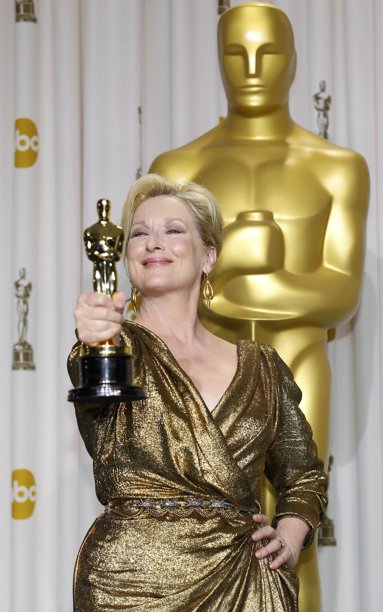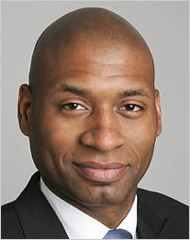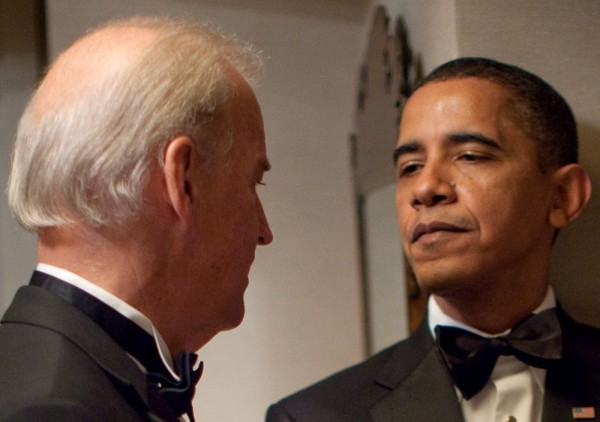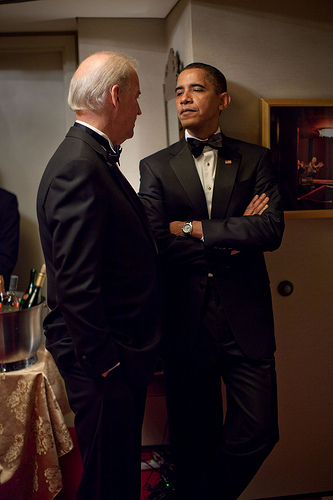|
Streep looking like an empress
While I am a big fan of Meryl Streep’s, I refuse to see her movie about Mrs. Thatcher. The reason is that I consider it totally unacceptable that the movie uses the pathetic debility of Thatcher’s old age against her. We all grow old if we don’t die young. It is monstrous and cruel to exploit the senility of a historical figure as a framing device for a movie about that person, as though the person’s senility—occurring, in this case, twenty years after the person left the public stage—showed the true meaning of her life and achievements. This is even more the case when the person is still alive and suffering.
That said, I like this photograph of Streep holding aloft her Academy Award for Best Actress last night. Her extravagant pride is so … anti-modern.
 Comments
Comments
David J. writes:
You hit so many home runs on VFR, especially with the recent posts on Muslim incompatibility with the West, that I almost daily read the website now.
Nevertheless, a potential foible of yours may be your taking too much stock into photographs and the seemingly biased interpretations of pictured facial expressions. For example, today, you posted an image of Meryl Streep and admitted that you liked her imperial, prideful look. I did not detect any negative criticism of her appearance from the post’s description (unless my reading comprehensive skills are wanting).
However, you have oftentimes heavily denounced the facial expression of a public figure, especially a black, with whom you disagreed or whose politics you deplored. In the posts below, you sharply criticized the appearance of arrogance from left-of-center black figures like Barack Obama and Charles Blow. It is as though you cannot separate a person’s ideological bent from his or her visage. If you view the person’s talent or politics positively, then your interpretation of his or her image will therefore be positive and vice versa.
You hold Meryl Streep, quite reasonably, in high esteem, so her look of effusive pride is rendered admiringly by VFR. Yet, you fault similar expressions from Obama, Blow, and others whose views are anathema to VFR.
Again, if you want Westerners to wake up and concede to the opinions of VFR, the said bias may detract from the site and offend newcomers.
LA replies:
You can’t be serious. Streep in that picture is at the top of her world, having won the Academy Award. She has achieved something objective to be proud about. What is Blow proud about in his official Times photo, other than being an entitled, full-of-himself black man who’s finally in a position in life where he can stick it to whitey?

I might add that the unpleasant arrogance in Blow’s photograph is matched by a similar quality in his columns.
And in the imperial photos of Obama I’ve criticized, as when he looked down his nose at Biden, he did not have a look of legitimate pride. He had a look of cold, superior contempt.
 The full-length shot is even worse:
The full-length shot is even worse:
 So these different photographs are different photographs, and I responded to each them according to its particular qualities. But you are acting as though any positive comment about one person’s prideful photograph must be “balanced” (do we have a quota here?) by a positive comment about another person’s prideful photograph. You’ve applied the word “pride” mechanically to different cases, without considering the distinct meanings it may have in different cases. You think, “Auster praises Streep’s look of pride, but criticizes Blow’s and Obama’s look of pride. Therefore Auster is contradicting himself and his treatment of people is biased according to whether they share his ideology or not (or, perhaps, whether they are white or not).” You need to pay attention to what I am actually saying about particular things and the reasons I say them, to the actual meaning of my words.
So these different photographs are different photographs, and I responded to each them according to its particular qualities. But you are acting as though any positive comment about one person’s prideful photograph must be “balanced” (do we have a quota here?) by a positive comment about another person’s prideful photograph. You’ve applied the word “pride” mechanically to different cases, without considering the distinct meanings it may have in different cases. You think, “Auster praises Streep’s look of pride, but criticizes Blow’s and Obama’s look of pride. Therefore Auster is contradicting himself and his treatment of people is biased according to whether they share his ideology or not (or, perhaps, whether they are white or not).” You need to pay attention to what I am actually saying about particular things and the reasons I say them, to the actual meaning of my words.
Another problem with your argument is that Meryl Streep, whom I admire greatly as an actress, is, apart from her highly intelligent acting, a shockingly unintelligent, unthinking liberal, as is painfully clear from every interview with her I’ve seen. Also, apart from the question of her politics, she seems like an amazingly uninteresting, “flat” human being, with nothing going on inside her. It’s as though all her intelligence is in her acting, and apart from her acting she is a bland cipher.
So the truth is the exact opposite of what you have accused me of. I admire Streep as an actress, and I expressed my liking for the way she looks in that photograph, despite the fact that I see her as a moronic liberal, and despite the fact that I generally have a negative reaction to her as a person.
LA continues:
Here’s another example. Rick Santorum is a social conservative, so by your reasoning I should be biased in his favor and find his personality pleasing. In fact, I find his personality such a turn-off that I fail (very unfairly to him no doubt) to attend to what he’s saying or take his statements seriously. My reaction to Santorum is the opposite of what—according to your theory of me—it ought to be.
Hannon writes:
In your discussion with David J. about the photo of Meryl Streep with her award, both of you stress term “prideful” with regard to her countenance and that of Obama and Mr. Blow. It struck me immediately that the difference—a vast difference—between Streep and the others is that Streep looks genuinely happy, even joyous. She is giving positive energy to the viewer. The two men appear contemptuous and by their negativity they are taking away energy from the viewer.
Kidist Paulos Asrat writes:
I agree with you. Meryl Streep looks delightfully happy, and in a funny way as only she can, modestly “unserious” about her pride (although she is clearly very happy with what has resulted from her work).
You wrote to your correspondent about her acting: “It’s as though all her intelligence is in her acting, and apart from her acting she is a bland cipher.”
That’s what I meant when I wrote: “She throws herself into her roles.” She literally gets filled up with something else. Most actors are acting a role. She embodies the person she’s impersonating. I find that fascinating and disconcerting. And in some way, I find that she gets some details wrong, like exaggerating Julia Child’s exuberance, and making her into a rather silly Englishwoman, whereas Child was very astute. Her choice (she does have a choice) to portray Thatcher in her aging years is another way she gets the essence of Thatcher’s persona wrong, I think. She seems to want to knock down these impressive people a couple of notches. Perhaps that is how she “relates” to them, and can act their parts.
For all the niceness that Obama tries to show, I keep finding him a cold and calculating person (president). That charm was his way to get to the American people, and the world at large. I think it is wearing thin now.
I don’t know much about Blow. But, he looks creepy, reptilian, in that photo.
It seems that it’s your correspondent who is reacting to the photos with an ideological bias.
This is something I’ve thought about. Is race such a difficult thing to surmount in blacks that they will always be hostile to the greater society? Can a black president ever feel “at home” in his role, despite the fawning admiration of whites? Are modern blacks that thankless that they will not take any act of generosity from whites with humble and unbiased, acceptance?
Paul K. writes:
Kidist Paulos Asrat writes: “Are modern blacks that thankless that they will not take any act of generosity from whites with humble and unbiased, acceptance?”
I think this is only true of high-profile blacks who find themselves in positions that they know, on some level, they didn’t merit. Blacks leading ordinary lives and performing honest work do not generally have this hostile attitude.
I agree with you about Meryl Streep’s insufferable political views—for example, her current cause is to establish a National Women’s History Museum in Washington, D.C., because, as she explained, “In case you haven’t noticed, there isn’t one.” However, the only time I’ve heard her interviewed was on a recent Fresh Air program, and I found much of what she had to say interesting—she sounded far more intelligent than the average actor. About her performance as Margaret Thatcher, she mentioned that Thatcher was mocked by her peers early in her political career because her voice became shrill when she spoke emphatically. She went to a voice coach and learned to lower her voice, correcting the problem. When I heard that, I thought there might be hope for Sarah Palin.
Steve R. writes:
A marvelous take down. I had the same reaction to reading David J.’s comment though I never could have articulated it so. And though he clearly is someone fast becoming a fan of your site you obviously were not, in the least, going to let that stand in the way of giving him what he seems he deserved.
I say, seems, only because I reread his comment and he did use the words, potential foible. I take this possibly to mean that he is uncertain about his accusation—albeit, I’ll admit, that any uncertainty he had, did not come across as he went about criticizing you.
It’s relevant to say in this context (and I hope you don’t mind me getting a little personal) that meeting you, in person, helped give me a better understanding of your attitude that might apply in a matter such as this. There is a certain mildness of being that comes across in you, in person, that could not, so much so, come across in your writing. Readers might occasionally misconstrue the attitude behind your words, as I’m sure I did—until we met.
When you begin with “You must be kidding,” often the person you’re writing to, is mistakenly, wont to read it as “YOU MUST BE KIDDING!!!” [LA replies: Actually I said, “You can’t be serious,” though I don’t know if that’s more rude or less rude than “You must be kidding.”] They are unaware that you disagree with them in a way, which, as I’ve learned at VFR, was typical of a bygone era—to disagree bluntly without, in the least, intending to make them feel that they are bad for having said what they did. Nor are you really mad at them for having said what they did. Am I wrong? [LA replies: You’re not wrong.] (Saying this I realize that your response to Ken Hechtman, the other day, was, justifiably, of a very different character.)
Anyway, as I read your response, with all the thoughts I have about what I think might be your true attitude, the thought that David J. sincerely appreciates what you offer, imagining his perception of your response, my new thoughts about the propriety of blunt disagreement, with all of that being the case, I just had to let you know that it all came together and generated a broad smile … and the thought, Larry, don’t change a hair for me.
And, Oh yes, thanks much for bringing attention to the very refreshing non-liberal pose of Miss Streep.
LA replies:
Thank you for the sympathetic analysis! Here’s the way I saw it. David J.’s idea that I am required to have the same reaction to Streep’s spectacular pose of joy and pride at the summit of her career, on one side, and to the cold arrogant looks of Blow and Obama, on the other, seemed so off-base, and such an unfair imposition on me, that I reacted by saying, “You can’t be serious.” I did not feel I was putting down David J. I felt I was bluntly rejecting what he was saying. And since his accusation of me was fairly serious, I felt I was justified in using fairly strong language in return.
Dan Dunham writes:
Meryl Streep, along with such as Tom Hanks, is to me the epitome of the arrogant Hollywood, actor/leftist—the revolting face of our masters and lords of the yuppified America. Why on earth do you have to keep shoving her onto web pages I usually view at least weekly?
She could walk on water and I would still gag at the thought of her or Hanks for that matter. What else would such a person do but butcher the memory and achievements of Thatcher? It’s the nature of the beast to defame any who would disagree with their world view.
LA replies:
While I haven’t seen the Thatcher movie for the reasons I gave, I think you are, out of justifiable dislike of Streep’s politics, reading a political agenda into her acting work which is not there. As an actress, she is an actress, not a promoter of political causes. And she has played sympathetic conservative characters. Consider her role as the head nun at a Catholic school in early 1960s Boston in the 2008 movie Doubt. She plays the pillar and guardian of the old regime who, with eagle eyes, always on the lookout for anything that threatens the proper order of things, correctly sees in the priest/principal, played by Philip Seymour Hoffman, something that is not right, and bravely confronts him, and ultimately forces him out of his job.
Yes, there are ambiguities in the story, and maybe she’s not entirely right and has made mistakes (as the title suggests). But the traditional conservative character she plays is highly admirable and the center of the movie and its life force.
February 28
Ken Hechtman writes:
If you want a better telling of the Margaret Thatcher story, try this 2006 documentary series from the BBC.
David J. writes:
I appreciate that you commented on and posted my response. Thanks for clarifying your view on the distinct types of prideful looks. I never thought of the matter in that way. I suppose the crux of it all is that people may interpret subjective issues like facial expressions differently and arguments can easily arise therefrom.
LA replies:
This is always a problem with posting one’s feelings about the physical appearance, dress, and expression of a public figure. Every time I do so I end up having to explain and justify my action to readers who think it’s improper to do so. Such responses are admittedly subjective. But does that mean that I should not have posted and praised that marvelous photo of Streep in the moment of her triumph? Does it mean I should not have posted that shot of Obama looking down his nose at Biden? The demeanor and personality of people, both well known and not, are expressions of our culture, our way of being. Never to remark on these things—and mainstream conservatives virtually never remark on them—is to make oneself blind to the reality in which we live. That reality does not just consist in facts, principles, political positions, and statistics. It consists of qualities. Contemporary people are blind and indifferent to qualities. And maybe the reason they are indifferent to qualities, is that qualities cannot be equalized. They cannot be technically and rationally arranged. The modern mind says it’s best to deal only with that which can be technically and rationally managed, and to ignore everything else.
Here’s an example of this that I was discussing with an intelligent liberal acquaintance the other day. I said to him that it seemed to me that even as recording and playing technology is advancing by leaps and bounds, the actual quality of sound we hear is much worse, for example, iTunes. Confirming my subjective impression, he replied that iTunes only contain 60 percent of the sound data contained in CDs (and for course CD’s contain far less of the original sound than vinyl recordings). Further, he said, no one cares. No one is bothered by or even notices the poor sound quality of iTunes. People are so excited and satisfied by the technical aspects of iTunes—being able to have so many recordings in a portable format wherever you go, and so on—that the actual quality of the music they are hearing doesn’t matter to them.
There’s more to say on this theme, particularly in relation to conservatives. Maybe later.
March 1
Hannon writes:
I am so glad you expanded on qualitative aspects of people in general, as here:
Contemporary people are blind and indifferent to qualities. And maybe the reason they are indifferent to qualities, is that qualities cannot be equalized.
I think it is the social covering up of what we feel qualitatively, more than our having given up these judgments altogether. I would not discount the suppressed and subconscious ways that we influence and are influenced. The music example is a good one, but I cannot help but feel that people generally have been like this always—there is a smaller percentage who is somehow attuned to nuances of food, art, socializing, etc., whereas a majority of the population is more generic in their habits and tastes. After all, without a relatively bland background, how can anything stand out as having noteworthy qualities?
Science shows similar signs of the same phenomenon of degradation found in politics (loss of dialogue and vocabulary) and music (efficiency over quality), e.g., the natural sciences being dominated today by statistical investigations at the expense of descriptive (and hence qualitative) output. Religion is not far behind. Is anything moving up the scale?
Posted by Lawrence Auster at February 27, 2012 03:23 PM | Send
|


